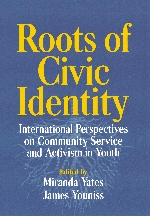Book contents
- Frontmatter
- Contents
- Preface
- List of Contributors
- Introduction: International Perspectives on the Roots of Civic Identity
- 1 Community Service and Political-Moral Discussions among Adolescents: A Study of a Mandatory School-Based Program in the United States
- 2 Social and Family Determinants of Community Service Involvement in Canadian Youth
- 3 Exploring Adolescent Altruism: British Young People's Involvement in Voluntary Work and Campaigning
- 4 Youth, Solidarity, and Civic Commitment in Italy: An Analysis of the Personal and Social Characteristics of Volunteers and Their Organizations
- 5 Political Socialization in the New States of Germany
- 6 Community Service and Social Cognitive Development in German Adolescents
- 7 Adolescents and the “Social Contract”: Developmental Roots of Citizenship in Seven Countries
- 8 Political Socialization in a Divided Society: The Case of Northern Ireland
- 9 Youth Experience in the Palestinian Intifada: A Case Study in Intensity, Complexity, Paradox, and Competence
- 10 Beyond the Call of Duty: The Service of Israeli Youth in Military and Civic Contexts
- 11 Recent Trends in Civic Engagement among Japanese Youth
- 12 Learning Politics in the Crucible: The Socialization of Taiwan High School Students as Citizens in a New Democracy
- Conclusion: Transcending Themes
- Author Index
- Subject Index
Introduction: International Perspectives on the Roots of Civic Identity
Published online by Cambridge University Press: 04 August 2010
- Frontmatter
- Contents
- Preface
- List of Contributors
- Introduction: International Perspectives on the Roots of Civic Identity
- 1 Community Service and Political-Moral Discussions among Adolescents: A Study of a Mandatory School-Based Program in the United States
- 2 Social and Family Determinants of Community Service Involvement in Canadian Youth
- 3 Exploring Adolescent Altruism: British Young People's Involvement in Voluntary Work and Campaigning
- 4 Youth, Solidarity, and Civic Commitment in Italy: An Analysis of the Personal and Social Characteristics of Volunteers and Their Organizations
- 5 Political Socialization in the New States of Germany
- 6 Community Service and Social Cognitive Development in German Adolescents
- 7 Adolescents and the “Social Contract”: Developmental Roots of Citizenship in Seven Countries
- 8 Political Socialization in a Divided Society: The Case of Northern Ireland
- 9 Youth Experience in the Palestinian Intifada: A Case Study in Intensity, Complexity, Paradox, and Competence
- 10 Beyond the Call of Duty: The Service of Israeli Youth in Military and Civic Contexts
- 11 Recent Trends in Civic Engagement among Japanese Youth
- 12 Learning Politics in the Crucible: The Socialization of Taiwan High School Students as Citizens in a New Democracy
- Conclusion: Transcending Themes
- Author Index
- Subject Index
Summary
This book presents a series of portraits of youth's involvement in community service and activism from various cultures and nations. One purpose of this global sampling is to gain an estimate of the political and moral development of contemporary youth insofar as it signifies what to expect from the next generation of citizens as we approach the twenty-first century. An equally important goal of this sampling is to learn more about the ways in which diverse governmental structures and formal socializing institutions affect youth's construction of political-moral identities.
Perhaps because we are approaching the end of the millennium, much hesitancy has been expressed about the present generation of youth and its ability to carry on and help reform our political and moral traditions. Some commentators have bemoaned the universal spread of the modern “youth culture” of MTV, jeans, and fast food around the globe. They also have criticized a rising interest in material possessions, coupling it with a fear that youth have placed hedonistic pleasure ahead of social obligation.
Without denying facts, many of us who study youth professionally believe that the evidence needs to be viewed carefully and that negative cases surely should not be generalized to youth at large. For example, in the United States, crimes against property, by far the largest category of juvenile crime, have held at a steady rate over the past 25 years (Siegel & Senna, 1994), and, although violent juvenile crime has increased in recent years, it still involves a small proportion of all youth (Siegel & Senna, 1994).
- Type
- Chapter
- Information
- Roots of Civic IdentityInternational Perspectives on Community Service and Activism in Youth, pp. 1 - 15Publisher: Cambridge University PressPrint publication year: 1998
- 2
- Cited by



